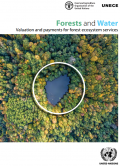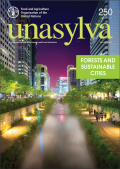Publicaciones de la FAO
El estado de los bosques del mundo 2018: Las vías forestales hacia el desarrollo sostenible
November 2018
November 2018
"El estado de los bosques del mundo 2018 presenta una evaluación de la contribución de los bosques y los árboles a nuestros paisajes y medios de subsistencia. La finalidad de esta publicación es brindar a un público mucho más amplio la posibilidad de comprender por qué los bosques y los árboles son importantes para las personas, para el planeta y para la posteridad."
The objectives of this study are to further improve our understanding about the ways in which payments for ecosystem services schemes can be applied to forests, in particular focusing on forest’s hydrological functions for the mutual benefit of both humans and the environment. In addition, the study covers advances and challenges facing these schemes and provides practical guidance for policymakers and practitioners. This study contains the most comprehensive currently available database of case studies on water-related payment for forest ecosystem services schemes in the UNECE region.
Bosques y ciudades sostenibles
March 2018
March 2018
Recently, Unasylva launched its 250 issue-focusing on forest and sustainable cities- amid, a suite of articles that unpack the forest-urban development nexus-the contribution ‘ Forests as nature-based solutions for ensuring urban water security’ pages 43-53- emphasized that increasing international attention on urban water security can serve as an opportunity to deploy smart, green, cost-effective water management policies in towns and cities
This working paper summarizes the outcomes of a meeting with 12 experts from the forest and water sectors hosted parallel to World Water Week. Except of the outcomes, this publication covers a background to the connection of forests and water, forest-water issues, and a joint statement on forest and water relationships. The statement can be downloaded separately here. This publication has been co-authored by the Food and Agriculture Organization of the United Nations (FAO), the International Union for Conservation of Nature (IUCN), and SIWI.
The involvement of communities in watershed management is essential. Communities are effected by what happens in a watershed, and their actions influence the downstream availability and quality of water, as well as other ecosystem services. Ensuring gender balance in decision-making processes is a key element in the new generation of watershed management programmes and projects. A case study from Pakistan supports the importance of gender equality in watershed management.





